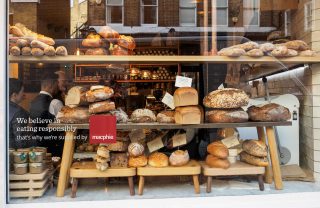
A 2020 study showed that 40% of European consumers are influenced by the environmental impact of their food and drink and are actively looking for extra product information like the brand’s story (Foresight Factory, 2020). And with pressure rising from both government and consumers, sustainability is no longer a nice to have. It should be a key ingredient within your business. But where do you start?
Having recently spoken at British Baker’s first sustainability webinar, Macphie’s sustainability manager Kirsty Allan shares her advice to make your bakery more sustainable.
“On the topic of sustainability, it’s easy to become overwhelmed to the point you don’t make any decisions,” she said.
“Don’t get bogged down in the enormity of it all. Just do something. Start small and you will make progress.”
- Measuring your carbon footprint
In order to know how you can make improvements, you need to understand how you’re currently performing. There are a number of free feasibility studies you can apply for which will measure factors like your carbon emissions or energy efficiency levels. In Scotland, there are opportunities with Zero Waste Scotland and Scottish Enterprise but keep up-to-date with UK funding opportunities online. These studies will also come with recommendations which can provide you with a starting point and a clear path to follow.
To find out what practical measures bakeries are putting in place to be more sustainable, we spoke to Baking Industry Award finalists White’s Bakery who were shortlisted in the sustainability category sponsored by Macphie.
Sales & marketing executive Georgina White said: “We have implemented a number of things – big and small – to become more sustainable. We began measuring our gas and electricity use on a weekly basis and from here we began limiting the amount of time our ovens were burning when they had no product in them. We also introduced timers and sensory lighting in different areas around our factories to make sure we weren’t leaving lights on when the area was out of use and switched to low-energy LED lighting.”
- Think about what you’re wasting
In spite of a huge rise in awareness of the impact of food production and waste on the ever-growing threat of climate change, the UK is still falling behind in sustainability responsibilities. A study by WRAP notes that 75% of waste is avoidable and it’s costing our industry £3.2billion.
We’re seeing big brands across the food industry making big commitments to tackle the issue of food waste. Greggs launched its first sustainability plan in March 2021, committing to cut food waste and source more sustainably by 2025 while Marks & Spencer has announced the rollout of its refillable programme – Fill Your Own – to a total of 11 stores, encouraging people to take only what they need and reduce the need for single-use plastic packaging.
Planning ahead is a great way to reduce waste but it’s impossible to calculate exactly how many bakes you’ll need for the day ahead or whether you’ll get through all of your raw ingredient stock. However, get creative to use up your leftovers. Today’s stale baguettes could become tomorrow’s pizza breads by adding a tomato base and toppings. Cake cut-offs can become fun cake pops for kids.
Make sure your ingredients are working hard for you and source versatile products that can be used across a variety of applications. Not only will this cut down complexity back of house but it will also help reduce waste.
Check out Macphie’s series of “Make more with” videos for inspiration on how they’re core range can be used in different ways.
Connecting with local charities is another great way to reduce waste. Reach out to local food banks or team up with apps like Too Good to Go who can redirect your waste product and get it to those in need.
- Think packaging
The food industry is trying to reduce its reliance on single-use plastic but there’s still a long way to go. Identify where you are using single-use plastic and wherever possible, switch to a more sustainable alternative. Companies like Vegware offer a variety of sustainable packaging options. For example, plastic cutlery or carrier bags. Beyond this, look to your suppliers for solutions. Challenge them on their own strategies around reducing plastic and make sure you’re using working with companies who are aligned to your values.
Click here to find out more on how Macphie is switching to more sustainable packaging.
Georgina at White’s Bakery added that one of their key strategies to become more sustainable has been to review their waste streams.
“We now recycle almost everything – clean cardboard, paper sacks, clean plastic buckets – with the aim of reducing our landfill waste to 0%,” she said.
“In the future, more and more customers will need reassurance that businesses are doing as much as possible to be environmentally friendly. The next generation of business over will only deal with those that are operating sustainably.”
Want to know more?
Check out British Baker’s sustainability webinar where Kirsty shared her advice alongside Too Good To Go, Lovingly Artisan and Pettigrew Bakeries. The webinar is now live on the British Baker website.
